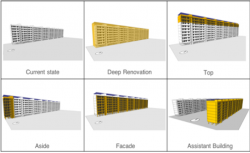Why not add space to your building to pay for the energy renovation?
Tackling climate change and cutting greenhouse gas emissions has become one of the most important global challenges and one of the EU’s top priorities. In this context the EU has set itself the target of reducing greenhouse gas emissions by 80-95% by 2050 compared to 1990 levels. Private households, representing 29% of the European energy consumption in 2014, are responsible for roughly 20% of all the greenhouse emissions in Europe (2015). To achieve its goal, the EU’s Research and Innovation programme “Horizon 2020” has financed a number of projects aimed at tackling societal challenges and emphasising excellent science. In this framework, the ABRACADABRA project has been launched and is in line with the European Commission’s Revised Energy Performance Building Directive also endorsed by the Architects’ Council of Europe (ACE) political position. The ACE together with 17 project partners recognises the need of incentivising energy retrofits aimed at functionally and aesthetically upgrading the existing European building stock. Currently only 1,2% of Europe’s existing building stock is renovated each year. This investment gap in the renovation sector is not only due to the high economic costs required up-front, but also to the long-term payback time and general lack of awareness of the energy benefit resulting from the refurbishment. Therefore, the absence of confidence of key stakeholders and investors can be identified as one of the main challenges of a strategy based on deep renovation. Here is where ABRACADABRA comes into play. ABRACADRABRA is a 3-year project, launched in 2016, funded on the principle that a substantial growth in the quality and quantity of renovation of the existing building stock can have a major impact in accelerating the revolution towards nearly Zero Energy. The Project’s goal is to demonstrate to key stakeholders and investors the attractiveness of a building renovation strategy based on volumetric additions and Renewable Energy Resources to achieve nearly Zero Energy. In short ABRACADABRA shows how adding usable space through building extensions and improving indoor comfort increases the real estate value of an existing property. This way a renovation can not only be more profitable, but also more sustainable. Volumetric additions, intended as rooftop extensions, aside or façade additions, as well as an entirely new building, should reduce the initial investment allocated for the renovation by selling or letting the additional space afterwards. Another critical point addressed by the ABRACADABRA project is urban sprawl. Through adding residential space to existing buildings, i.e. conducting an urban densification, it is possible to reduce the urban sprawl, reduce land consumption and protect our green spaces around cities. The final goal of the project is to provoke a legislative and market change in order to accelerate the revolution towards nearly Zero Energy in existing buildings. Furthermore, ABRA has applied its strategy to several pilot cases in order to directly test the proposed. As a result, ABRA has created two free and user-friendly toolkits that can be used by the entire stakeholders’ community. ABRA is also currently looking for new case study buildings to include in the project. The new case studies will be tested to analyse the possible volumetric additions and renewables and besides access to the ABRA toolkit, will receive the expertise of the project team. On 6 February the project team will present the developed toolkits in an open event in Brussels. You are invited to attend this event, as well as the final international conference in Brussels on 7 February 2019. Finally, ABRA is seeking the support of local authorities and municipalities in its effort of pursuing the goal of achieving the European Energy Efficiency target. To know more about the project check out the ABRA website http://www.abracadabra-project.eu/(opens in new window) and Twitter https://twitter.com/abracadabra_eu?lang=en(opens in new window)
Keywords
Countries
Belgium, Bulgaria, Germany, Greece, Spain, Italy, Latvia, Netherlands, Norway, Romania, United Kingdom



